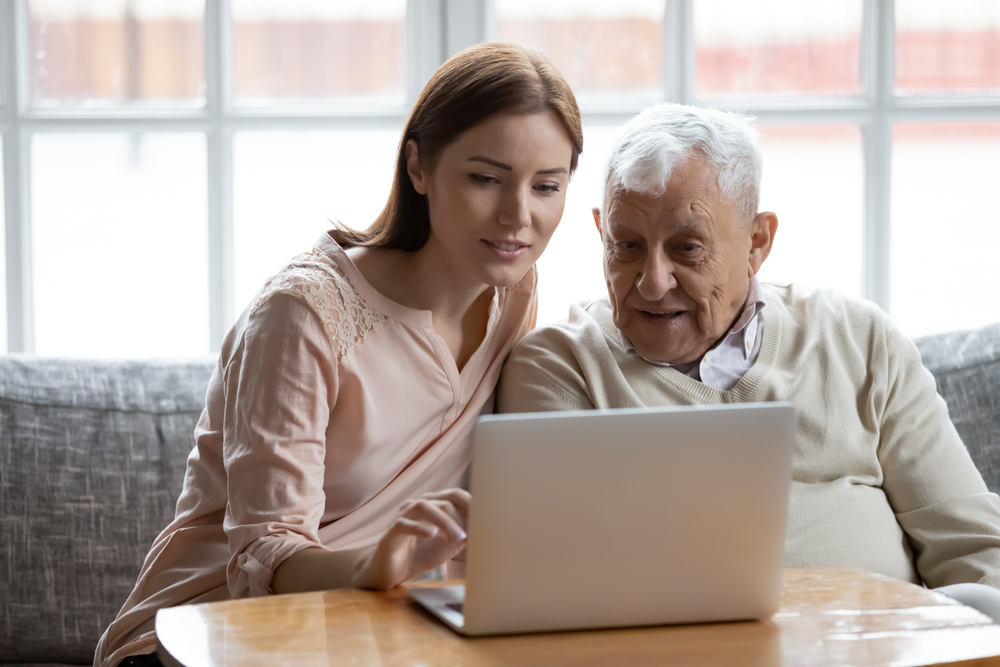Understanding Vision Rehabilitation
This content is also available in:
Español (Spanish)

What are vision rehabilitation services?
The term “vision rehabilitation” includes a wide range of professional services that can restore functioning after declining vision, just as physical therapy restores function after a stroke or other injury. Vision rehabilitation services allow people who have recently lost vision, are blind, or have low vision to continue to live independently and maintain their accustomed quality of life.
Although your eye doctor is the professional you’ll likely turn to first when dealing with your own – or a family member’s – declining vision, it’s important to note that many different kinds of vision rehabilitation services are available in addition to the eye care provided by your family doctor, ophthalmologist, optometrist, or low vision specialist. In fact, your doctor may not be aware of, or refer you to, these comprehensive vision rehabilitation services, often provided through a state or non-profit rehabilitation agency, at little or no out-of-pocket cost.
Who provides vision rehabilitation services?
Vision rehabilitation services for adults who have recently lost vision, are blind, or have low vision are provided by a team of specially trained professionals, which may include low vision therapists, vision rehabilitation therapists, and orientation and mobility specialists:
Low Vision Therapists
Certified Low Vision Therapists (CLVTs and SCLVs) instruct individuals to use their remaining vision efficiently with optical devices, non-optical devices, and assistive technology. They can help determine the need for home, workplace, or school environmental modifications. You can learn more about these professionals at the Low Vision Therapy website and the American Occupational Therapy Association – Low Vision website.
You can learn more about Low Vision Specialists at The Different Types of Eye Care Professionals on the VisionAware website.
Vision Rehabilitation Therapists
Certified Vision Rehabilitation Therapists (CVRTs) teach adaptive independent living skills, enabling adults who are blind or have low vision to carry out a range of daily activities confidently. CVRTs work with individuals in their homes, rehabilitation facilities, and employment settings. You can learn more about these professionals at the Vision Rehabilitation Therapy website.
To learn more about what a Vision Rehabilitation Therapist does and how you could benefit, read What Is a Vision Rehabilitation Therapist?
Orientation and Mobility Specialists
Certified Orientation and Mobility Specialists (COMS or O&Ms) teach the skills and concepts that people who are blind or have low vision need to travel independently and safely in the home and the community.
O&Ms teach safe and independent indoor and outdoor travel skills, including using a long cane, electronic travel devices (such as GPS), public transportation, sighted guide, human guide, and pre-cane skills. You can learn more about these professionals at the Orientation and Mobility website.
To learn more about university programs and training in Orientation and Mobility and Vision Rehabilitation Therapy, you can watch and listen to Hunter College’s YouTube video.
Lachelle Smith, M.S., CVRT, Director, Vision Rehab Programs at Salus University

Lachelle Smith is a certified vision rehabilitation therapist (CVRT) and director/coordinator of the vision rehabilitation therapy (VRT) graduate programs at Salus University in Philadelphia, PA. Lachelle was born with an eye condition and grew up in a small town in Central Pennsylvania where “everyone knew who you were and to whom you belonged. Most neighbors also knew that I was the child who was born blind. Even though I was not born totally blind, most people in my town didn’t understand the different levels and types of visual impairment, so they thought of me as blind.”
Read Lachelle’s life story and learn more about the long, sometimes indirect, road that led her to a career as a university instructor in vision rehabilitation therapy, where she trains her master’s students to teach the following independent living to adults who are blind or have low vision:
- Personal self-care
- Cooking and meal preparation
- Household organization and management
- Also, check out our Getting Started Kit for more ideas to help you live well with low vision.
What will I learn from vision rehabilitation lessons and training?
- Communication skills: reading and writing, braille, and assistive computer technology
- Counseling: to help you, your spouse, family members, and friends adjust to blindness or low vision
- Independent living and personal management skills: home modifications, home repairs, self-care, financial management, recreation and leisure activities, and using the telephone
- Independent movement and travel skills: moving about safely indoors, using transportation, and traveling safely outdoors with a long white cane or other device
- Low vision evaluations and training with low-vision devices: the low vision examination, bioptics for driving, low vision optical devices, and non-optical devices, such as held magnifiers, special reading glasses, telescopes, and high-intensity lamps that can make the best use of remaining vision
- Vocational rehabilitation: Getting back to work after blindness/ low vision or breaking into the workplace as a job seeker with blindness or low vision, including vocational evaluation and training, job training, job modification and restructuring, and job placement.
Peer Advisor DeAnna Quietwater Noriega Asks: How Independent Do You Want to Be?
 DeAnna Noriega with
DeAnna Noriega with
her guide dog
Do you handle your finances? Do you arrange your transportation? Do you live alone or with family members who seek to protect you? Do you manage your affairs, prepare meals, shop, hold down a job you love, and care for your home?
All of these things are possible if they are things you want to do. You can learn more about them by reading the Essential Skills for Everyday Living section of VisionAware.
What Can Help You with Your Independence?
The training, tools, and techniques to accomplish an independent lifestyle are all available – and possible.
However, the choices of what you wish to learn and what you want to do are up to you. Some of these things will depend on what you enjoy doing, your life circumstances, and whether you wish to regain control of your life. If you have never done some of these things, such as handling your finances because your spouse always did that, you could decide not to bother learning that skill. How much control of your life you want is up to you, as are the methods you choose to employ.
For example, you might use magnification, computers with optical character recognition, and online banking to handle your money. Or you might allow a family member to pay your bills. You might use a reader to read your mail or use technology to do it. The choice is up to you.
If you like to control how, where, and when you accomplish tasks, you might opt to attend classes or spend time at a rehabilitation center to master the skills you will need.
Who certifies vision rehabilitation professionals?
Many vision rehabilitation professionals hold graduate degrees in their areas of expertise. In addition, many also hold specialized certifications.
The Academy for Certification of Vision Rehabilitation and Education Professionals (ACVREP) offers certification for Low Vision Therapists (CLVTs), Vision Rehabilitation Therapists (CVRTs), Orientation and Mobility Specialists (COMS), and Certified Assistive Technology Instructional Specialists for People with Visual Impairments (CATIS). ACVREP also provides a searchable database you can use to check the certification credentials of your service providers.
Please note: The ACVREP database will only return the names and locations (by state) of individuals already certified by ACVREP. It will not help you locate additional non-certified service providers in your state.
The American Occupational Therapy Association (AOTA) offers Specialty Certification in Low Vision to Occupational Therapists. AOTA provides a database of specialty-certified low-vision practitioners.
Is there a membership organization for vision rehabilitation professionals?
- The Association for Education and Rehabilitation of the Blind and Visually Impaired (AERBVI) is an international membership organization for vision rehabilitation professionals. AERBVI provides continuing education, publications, and regional, national, and international conferences.
- The Association of Vision Rehabilitation Therapists (AVRT) is the professional organization for Vision Rehabilitation Therapists, providing services to persons with blindness or low vision across the country.
- The American Occupational Therapy Association (AOTA) is the national professional association to represent the interests and concerns of occupational therapy practitioners and students of occupational therapy and to improve the quality of occupational therapy.
Do I have to attend a school or center, or can I learn at home?
That depends upon the agency that provides your vision rehabilitation services and the type and length of training you require:
- Some agencies employ vision rehabilitation professionals who work with you in your home and develop a training program that best meets your needs.
- Other agencies provide vision rehabilitation training in agency-based settings that you attend daily.
- Some specialized residential rehabilitation centers require long-term (one month or longer) stays.
Is there a waiting list for vision rehabilitation services?
That also depends upon the agency that provides your vision rehabilitation services and the type and length of training you request. Be sure to ask about waiting lists when you inquire about the agency’s services.
Be your own best advocate when exploring vision rehabilitation services. You may find, for example, that your doctor makes a referral to an occupational therapist (OT) within the medical practice for rehabilitation training that will be billed to you or your insurance.
You may also find a vision rehabilitation therapist (CVRT) available through a local state or non-profit agency at no out-of-pocket cost. Alternatively, if there is a waiting list through your local or state agency, you may want to look for alternatives, such as an OT or out-of-pocket training with a specialist.
Can I learn on my own without going to an agency?
Several self-help and self-study options can help you learn more about vision rehabilitation:
- The VisionAware Personal Stories series provides real-life interviews with men and women who are blind or have low vision.
- The E.A.R.S. for EYES Program provides free self-study audiotapes that teach adaptive daily living skills to adults who are blind or have low vision. Subject areas include kitchen techniques, eating skills, indoor mobility, and personal grooming.
- The Hadley offers free workshops and podcasts on living with vision loss. Informational areas include h braille and communication skills, independent living, recreation and leisure, assistive technology, and many other subjects.
How can I locate vision rehabilitation services?
Your state rehabilitation agency or an online searchable database can help you locate vision rehabilitation agencies in your area and find the best services for you. See our listings for State and Local Rehabilitation Agencies.
Are vision rehabilitation services different from older adult services?
As you begin searching for vision rehabilitation services, it’s helpful to review the overall network of services for older adults to understand better how specialized vision rehabilitation services “fit” (or sometimes don’t fit) within the current system of programs and services.
This “network,” developed from the Older Americans Act (OAA), was the first legislation to address community-based services for adults aged 60 and older. The OAA also coordinates services from federal, state, and local agencies.
The Administration on Aging (AoA) oversees the administration of programs and services authorized through the OAA. The AoA also hosts the National Eldercare Locator, a searchable database to help you find local agencies and resources that enable older adults to live independently in their home communities.
State Units on Aging and Disabilities develop and administer programs and coordinate statewide service delivery systems. All states have a Department on Aging. You can find how to contact your state’s department on aging at the Database (acl.gov)
The USAging Association develops and administers programs and coordinates statewide service delivery systems. All states have a Department on Aging. The n4a develops, coordinates, and provides local services that enable older adults to remain at home and in their communities. These services include:
- Telephone Reassurance
- Homemaker/chore service
- Transportation
- Information and referral
- Meals on Wheels
- Friendly visiting
- Legal assistance
- Case management
- Senior centers
- Adult daycare and respite services
By Maureen A. Duffy, M.S., CVRT